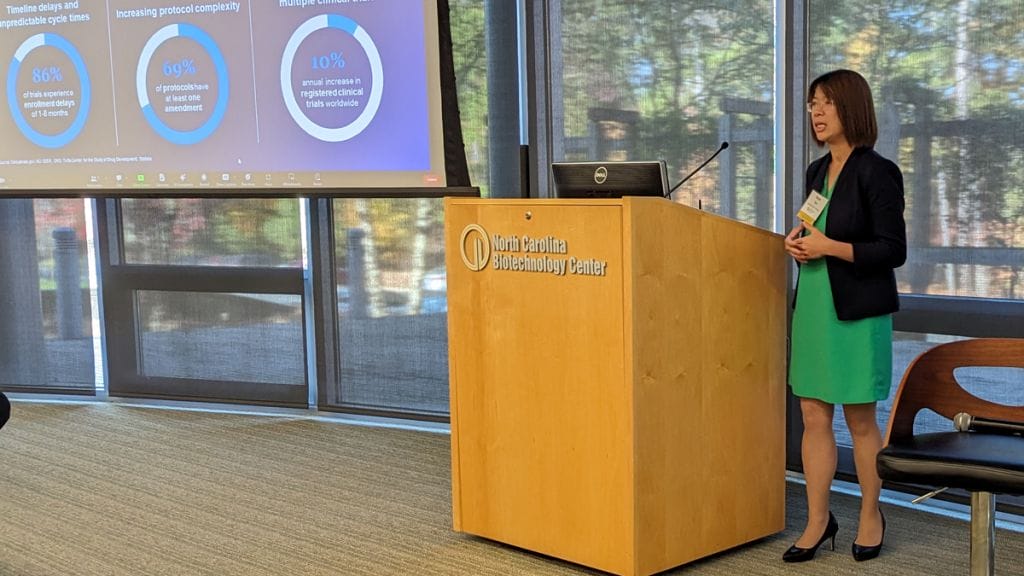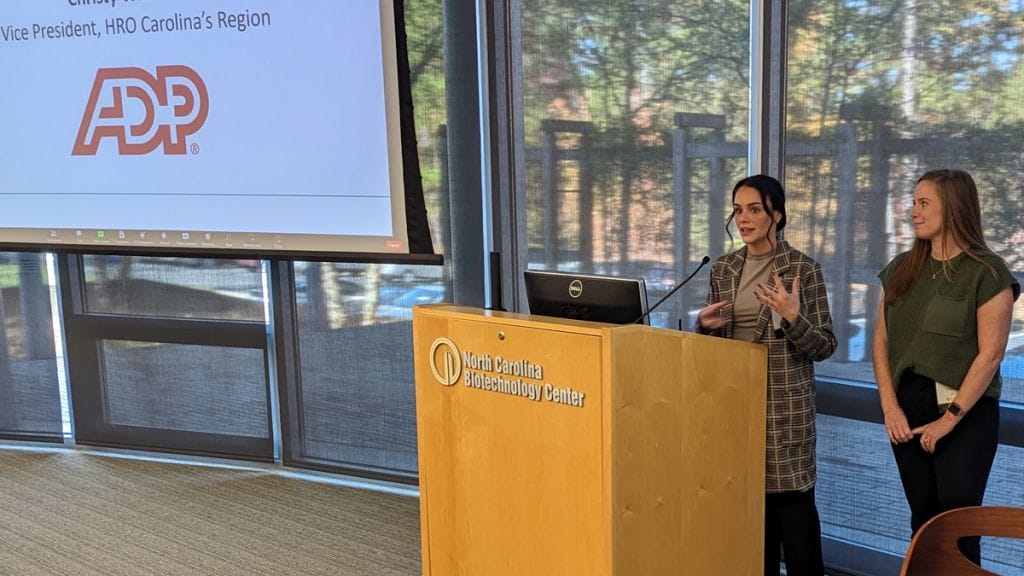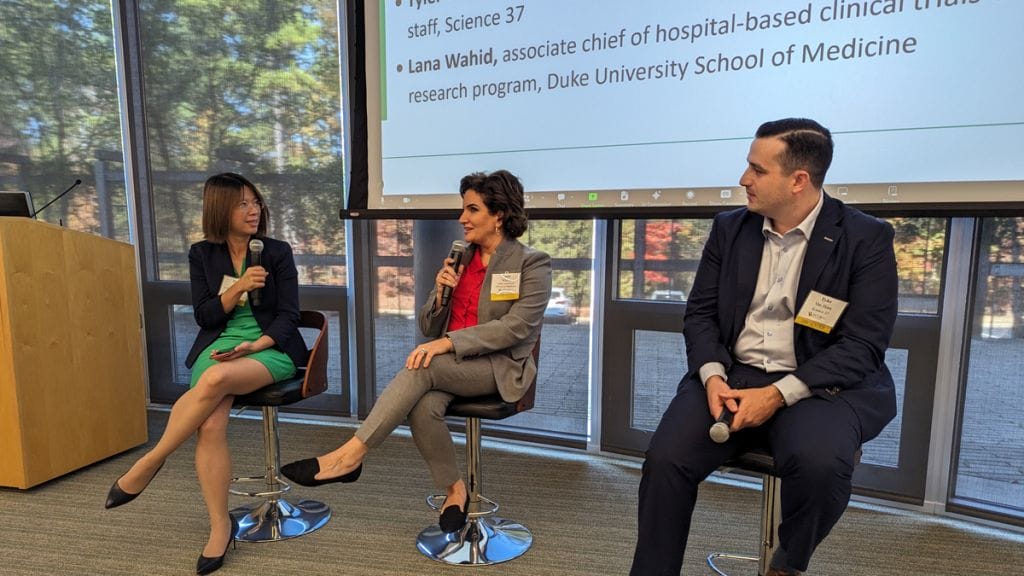Forum explores AI, machine learning in clinical trials




A panel of experts explored the potential of AI and machine learning to improve clinical trials by reducing costs, improving speed and increasing the probability of success at the Nov. 8 Clinical Research Forum hosted by the NC Life Sciences Organization at the NC Biotechnology Center.
The most effective use cases for AI and machine learning identified by the panelists included recommendations and forecasting, patient identification, medical record review and site staff task management.
The event was sponsored by ADP, Clancy & Theys Construction Company and YourBio Health.
Hann Yew, partner at McKinsey & Company, moderated a panel comprising
- West Barnes, senior director of product management at IQVIA;
- Tyler Van Horn, vice president of corporate strategy and chief of staff at Science 37; and
- Lana Wahid, M.D., associate chief of hospital-based clinical trials and research program, Duke University School of Medicine.
Yew kicked things off by discussing the challenges of clinical trials and the potential of digital analytics to improve problems such as longer timelines, higher costs and more complex protocols. She also said that the number of trials is increasing, but the patient pool is limited, which can make it difficult to recruit participants.
She said that AI and machine learning can be used to
- reduce costs by streamlining processes and automating tasks,
- improve speed by optimizing trial design and enrollment and
- increase the probability of success by improving decision-making.
Yew gave some examples of how AI and machine learning are being used in clinical trials, such as
- summarizing and understanding clinical data,
- optimizing trial design,
- improving site selection,
- engage patients and
- interacting with regulatory authorities.
Yew concluded by saying that there is a lot of excitement about the potential of AI and machine learning to improve clinical trial and that she was eager to learn more about how AI and machine learning can be used to help patients get access to new and innovative treatments more quickly.
The panel kicked off its discussion with Barnes and Van Horn talking about the most effective use cases for AI and machine learning in clinical research.
From the CRO perspective, Barnes said that recommendations and forecasting are two areas that can benefit most from AI. Specifically, AI and machine learning can be used to identify good protocols for benchmarking, select sites and forecast enrollment rates, dropout rates, milestones and timelines.
From the trial site perspective, Van Horn emphasized AI's uses in patient identification, medical record review and site staff task management. He said that AI can be used to pull patients through screening, identify eligible patients and recommend next best actions for site staff.
Van Horn said he also sees potential for AI to be used to solve capacity issues from a resourcing perspective or to review and understand protocol amendments. However, he said that there are still challenges to using AI in the patient engagement side of things due to the need for a safe and compliant process with consistent outputs.
Wahid then described her journey in discovering the value of AI in setting up her clinical research program at Duke. She said she was initially overwhelmed by the workload of manually screening patients for clinical trials, but they realized that AI could automate this process. She worked with the Duke IT team to develop a screening tool that could identify eligible patients in a matter of seconds. Wahid said the tool has helped her be more efficient and effective in her research, and it has also allowed her to give patients more control over their participation in clinical trials.
The panelists moved on to discussing the importance of perseverance and iteration in scaling innovation in the clinical trial industry. They emphasized that it is important to establish success criteria and proof points upfront and to be willing to stick with something and iterate on it, even if the goalposts move around along the way.
They also said that it is important to educate sponsors and stakeholders on the iterative nature of technology development. Wahid said that she and her team persevered through 13 iterations of a screening tool before finding the sweet spot. She credits the IT department's support and her own determination for helping her to see the project through to completion.
The panelists concluded that scaling innovation in the clinical trial industry requires a commitment to perseverance, iteration and communication.
Next, the panelists discussed the challenge of finding and retaining technical talent in the clinical trials industry. They noted that it is difficult to find people with both the technical skills and the knowledge of the highly regulated health care environment.
Van Horn said that Science 37 had to educate people from outside the industry about the unique requirements of clinical trials. He also said that it is important to partner technical people with subject matter experts in order to create effective solutions.
Barnes, who has experience working at both CROs and technology companies, agreed that it is easier to teach someone with a technical background about clinical trials than vice versa. He also emphasized the importance of financial investment in attracting and retaining top talent.
The panelists agreed that capability building in the clinical trials industry is essential, but it is also challenging. They recommend investing in training and development, partnering with subject matter experts and working with partners who have the necessary talent on hand.
Finally, the panelists discussed the challenges of adopting AI in the clinical trials industry, specifically the need for clear inputs and outputs, and the difficulty in keeping up with the constantly changing and evolving models.
Van Horn said he believed that regulatory changes are coming, but they are slow. He sees the applications of AI in the near term being largely operational, such as helping to answer business questions, review documents and identify changes in documents.
Some regulatory changes the panel suggested are
- clearer guidance on the use of AI in clinical trials from regulatory agencies,
- more collaboration between regulatory agencies and industry stakeholders to develop standards for the use of AI and
- increased investment in research and development of AI for clinical trials.
Barnes said that because AI is still in its early stages of development, it is important to find the right use cases and user interfaces in order to build trust with users.
Hann Yew concluded by saying that AI should be seen as a copilot or support system for people, and that it is not likely to replace people in clinical trials anytime soon.
